Impact of Organizational Behaviour on Unilever's Performance Report
VerifiedAdded on 2023/01/11
|20
|5382
|80
Report
AI Summary
This report provides an in-depth analysis of organizational behavior within Unilever, examining the influence of culture, power, and politics on individual behavior. It explores various motivation theories, including content and process theories like Maslow's Hierarchy of Needs, Hertzberg's Two-Factor Theory, and McClelland's Theory of Needs, and their application in influencing employees. The report contrasts effective and ineffective team dynamics, highlighting their significance for organizational growth. Furthermore, it discusses the application of organizational behavior concepts and philosophies within Unilever, such as the use of Hostede’s culture model and French and Raven Model. The report also touches on the importance of avoiding negative political environments to foster employee satisfaction and productivity.
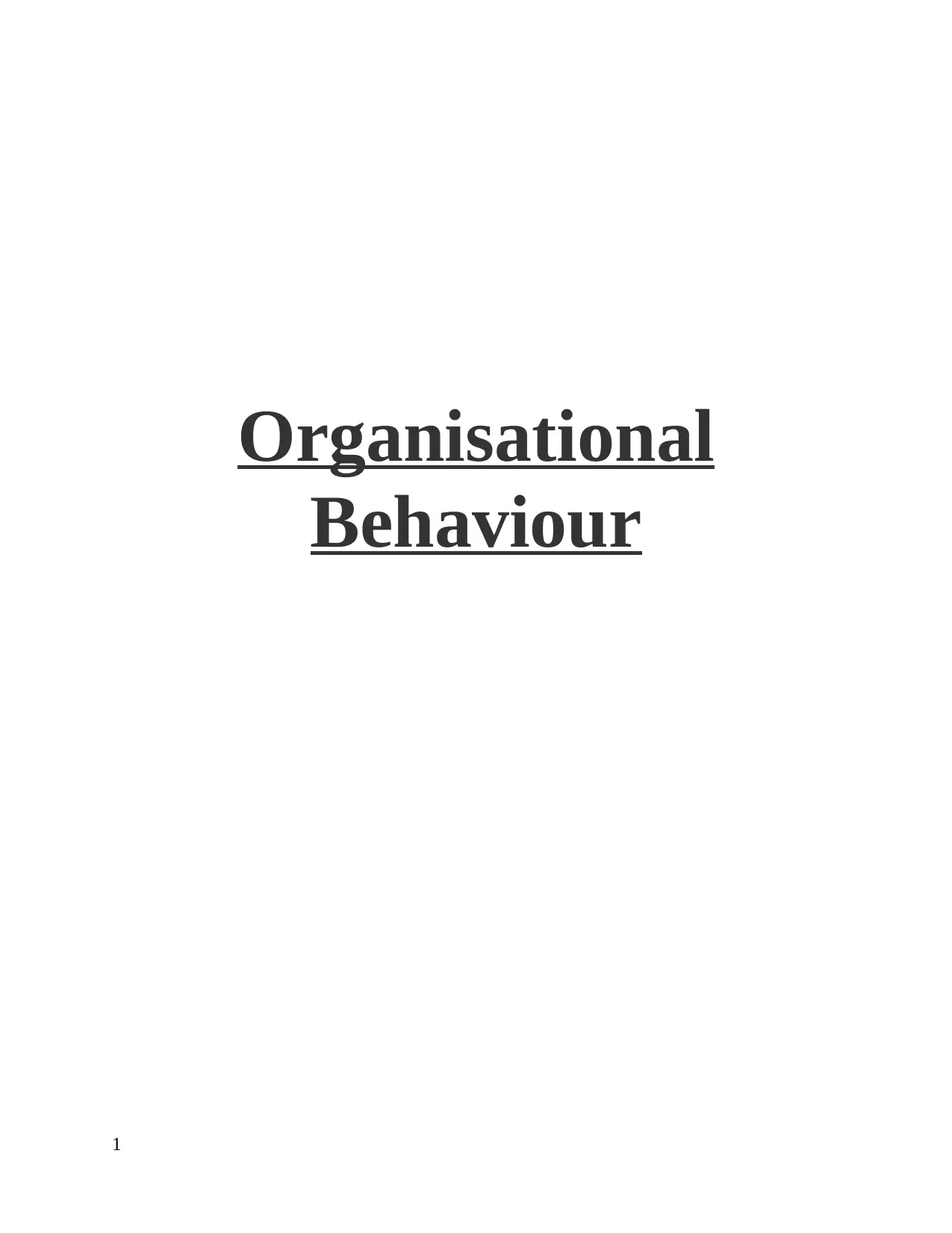
Organisational
Behaviour
1
Behaviour
1
Paraphrase This Document
Need a fresh take? Get an instant paraphrase of this document with our AI Paraphraser
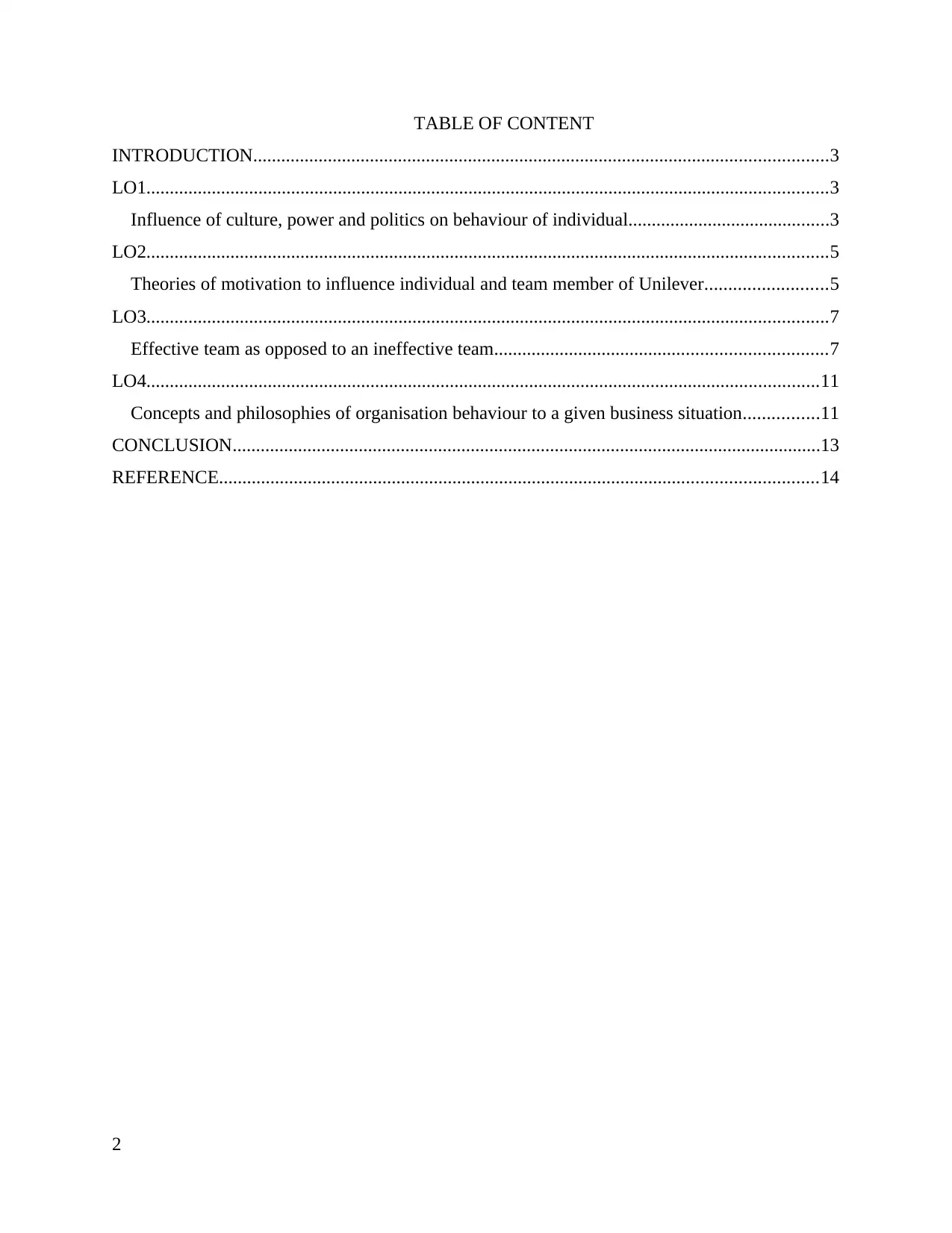
TABLE OF CONTENT
INTRODUCTION...........................................................................................................................3
LO1..................................................................................................................................................3
Influence of culture, power and politics on behaviour of individual...........................................3
LO2..................................................................................................................................................5
Theories of motivation to influence individual and team member of Unilever..........................5
LO3..................................................................................................................................................7
Effective team as opposed to an ineffective team.......................................................................7
LO4................................................................................................................................................11
Concepts and philosophies of organisation behaviour to a given business situation................11
CONCLUSION..............................................................................................................................13
REFERENCE................................................................................................................................14
2
INTRODUCTION...........................................................................................................................3
LO1..................................................................................................................................................3
Influence of culture, power and politics on behaviour of individual...........................................3
LO2..................................................................................................................................................5
Theories of motivation to influence individual and team member of Unilever..........................5
LO3..................................................................................................................................................7
Effective team as opposed to an ineffective team.......................................................................7
LO4................................................................................................................................................11
Concepts and philosophies of organisation behaviour to a given business situation................11
CONCLUSION..............................................................................................................................13
REFERENCE................................................................................................................................14
2
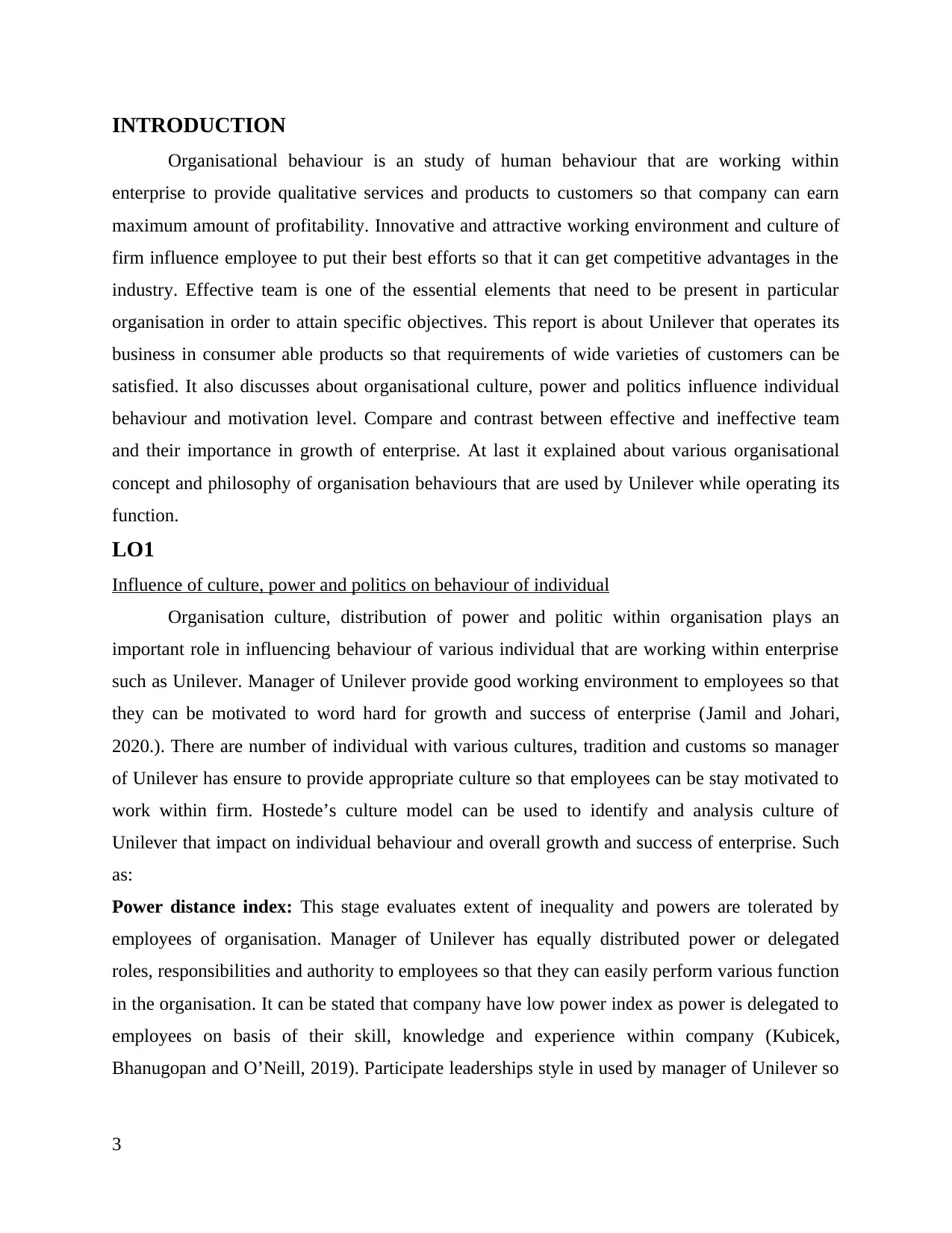
INTRODUCTION
Organisational behaviour is an study of human behaviour that are working within
enterprise to provide qualitative services and products to customers so that company can earn
maximum amount of profitability. Innovative and attractive working environment and culture of
firm influence employee to put their best efforts so that it can get competitive advantages in the
industry. Effective team is one of the essential elements that need to be present in particular
organisation in order to attain specific objectives. This report is about Unilever that operates its
business in consumer able products so that requirements of wide varieties of customers can be
satisfied. It also discusses about organisational culture, power and politics influence individual
behaviour and motivation level. Compare and contrast between effective and ineffective team
and their importance in growth of enterprise. At last it explained about various organisational
concept and philosophy of organisation behaviours that are used by Unilever while operating its
function.
LO1
Influence of culture, power and politics on behaviour of individual
Organisation culture, distribution of power and politic within organisation plays an
important role in influencing behaviour of various individual that are working within enterprise
such as Unilever. Manager of Unilever provide good working environment to employees so that
they can be motivated to word hard for growth and success of enterprise (Jamil and Johari,
2020.). There are number of individual with various cultures, tradition and customs so manager
of Unilever has ensure to provide appropriate culture so that employees can be stay motivated to
work within firm. Hostede’s culture model can be used to identify and analysis culture of
Unilever that impact on individual behaviour and overall growth and success of enterprise. Such
as:
Power distance index: This stage evaluates extent of inequality and powers are tolerated by
employees of organisation. Manager of Unilever has equally distributed power or delegated
roles, responsibilities and authority to employees so that they can easily perform various function
in the organisation. It can be stated that company have low power index as power is delegated to
employees on basis of their skill, knowledge and experience within company (Kubicek,
Bhanugopan and O’Neill, 2019). Participate leaderships style in used by manager of Unilever so
3
Organisational behaviour is an study of human behaviour that are working within
enterprise to provide qualitative services and products to customers so that company can earn
maximum amount of profitability. Innovative and attractive working environment and culture of
firm influence employee to put their best efforts so that it can get competitive advantages in the
industry. Effective team is one of the essential elements that need to be present in particular
organisation in order to attain specific objectives. This report is about Unilever that operates its
business in consumer able products so that requirements of wide varieties of customers can be
satisfied. It also discusses about organisational culture, power and politics influence individual
behaviour and motivation level. Compare and contrast between effective and ineffective team
and their importance in growth of enterprise. At last it explained about various organisational
concept and philosophy of organisation behaviours that are used by Unilever while operating its
function.
LO1
Influence of culture, power and politics on behaviour of individual
Organisation culture, distribution of power and politic within organisation plays an
important role in influencing behaviour of various individual that are working within enterprise
such as Unilever. Manager of Unilever provide good working environment to employees so that
they can be motivated to word hard for growth and success of enterprise (Jamil and Johari,
2020.). There are number of individual with various cultures, tradition and customs so manager
of Unilever has ensure to provide appropriate culture so that employees can be stay motivated to
work within firm. Hostede’s culture model can be used to identify and analysis culture of
Unilever that impact on individual behaviour and overall growth and success of enterprise. Such
as:
Power distance index: This stage evaluates extent of inequality and powers are tolerated by
employees of organisation. Manager of Unilever has equally distributed power or delegated
roles, responsibilities and authority to employees so that they can easily perform various function
in the organisation. It can be stated that company have low power index as power is delegated to
employees on basis of their skill, knowledge and experience within company (Kubicek,
Bhanugopan and O’Neill, 2019). Participate leaderships style in used by manager of Unilever so
3
⊘ This is a preview!⊘
Do you want full access?
Subscribe today to unlock all pages.

Trusted by 1+ million students worldwide
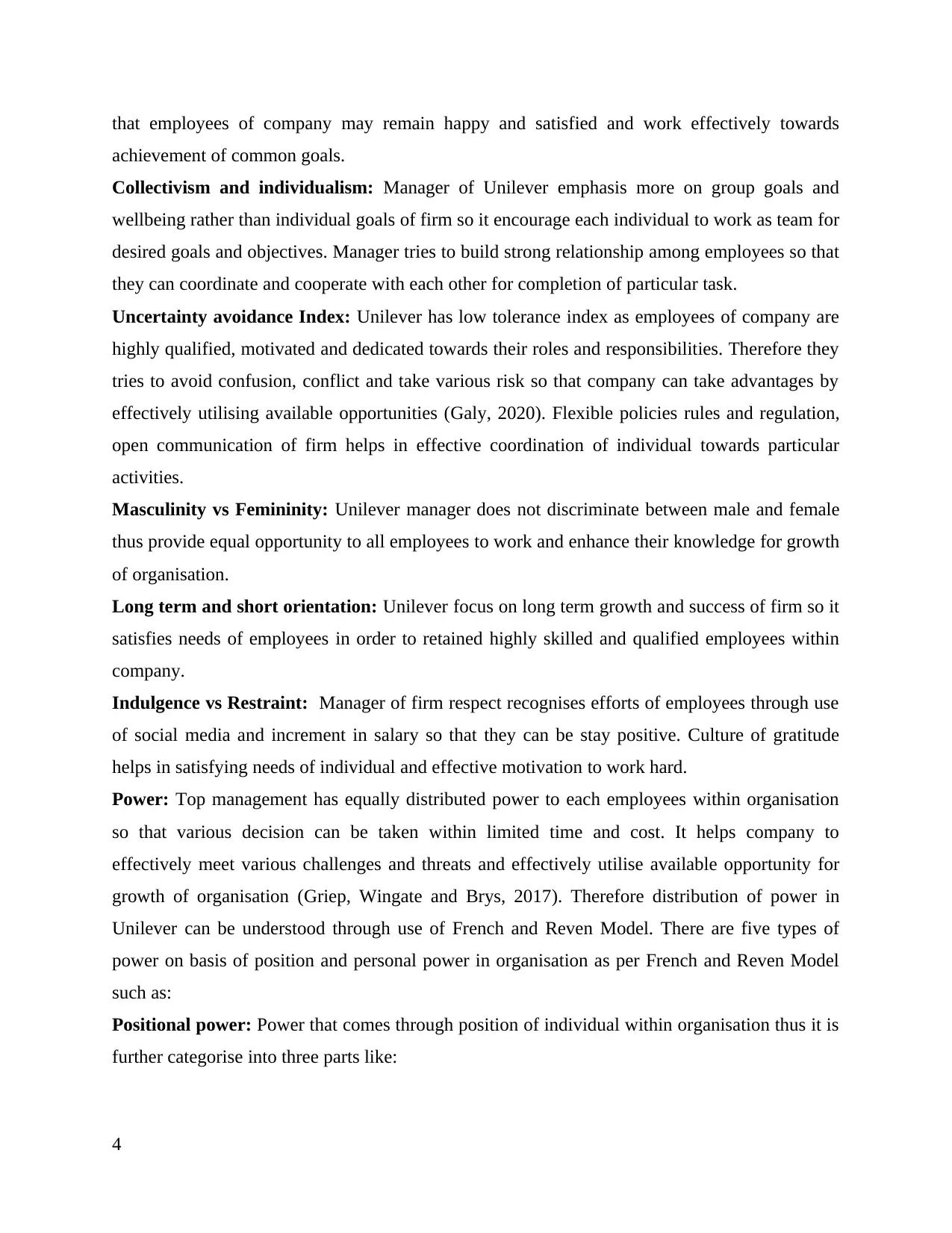
that employees of company may remain happy and satisfied and work effectively towards
achievement of common goals.
Collectivism and individualism: Manager of Unilever emphasis more on group goals and
wellbeing rather than individual goals of firm so it encourage each individual to work as team for
desired goals and objectives. Manager tries to build strong relationship among employees so that
they can coordinate and cooperate with each other for completion of particular task.
Uncertainty avoidance Index: Unilever has low tolerance index as employees of company are
highly qualified, motivated and dedicated towards their roles and responsibilities. Therefore they
tries to avoid confusion, conflict and take various risk so that company can take advantages by
effectively utilising available opportunities (Galy, 2020). Flexible policies rules and regulation,
open communication of firm helps in effective coordination of individual towards particular
activities.
Masculinity vs Femininity: Unilever manager does not discriminate between male and female
thus provide equal opportunity to all employees to work and enhance their knowledge for growth
of organisation.
Long term and short orientation: Unilever focus on long term growth and success of firm so it
satisfies needs of employees in order to retained highly skilled and qualified employees within
company.
Indulgence vs Restraint: Manager of firm respect recognises efforts of employees through use
of social media and increment in salary so that they can be stay positive. Culture of gratitude
helps in satisfying needs of individual and effective motivation to work hard.
Power: Top management has equally distributed power to each employees within organisation
so that various decision can be taken within limited time and cost. It helps company to
effectively meet various challenges and threats and effectively utilise available opportunity for
growth of organisation (Griep, Wingate and Brys, 2017). Therefore distribution of power in
Unilever can be understood through use of French and Reven Model. There are five types of
power on basis of position and personal power in organisation as per French and Reven Model
such as:
Positional power: Power that comes through position of individual within organisation thus it is
further categorise into three parts like:
4
achievement of common goals.
Collectivism and individualism: Manager of Unilever emphasis more on group goals and
wellbeing rather than individual goals of firm so it encourage each individual to work as team for
desired goals and objectives. Manager tries to build strong relationship among employees so that
they can coordinate and cooperate with each other for completion of particular task.
Uncertainty avoidance Index: Unilever has low tolerance index as employees of company are
highly qualified, motivated and dedicated towards their roles and responsibilities. Therefore they
tries to avoid confusion, conflict and take various risk so that company can take advantages by
effectively utilising available opportunities (Galy, 2020). Flexible policies rules and regulation,
open communication of firm helps in effective coordination of individual towards particular
activities.
Masculinity vs Femininity: Unilever manager does not discriminate between male and female
thus provide equal opportunity to all employees to work and enhance their knowledge for growth
of organisation.
Long term and short orientation: Unilever focus on long term growth and success of firm so it
satisfies needs of employees in order to retained highly skilled and qualified employees within
company.
Indulgence vs Restraint: Manager of firm respect recognises efforts of employees through use
of social media and increment in salary so that they can be stay positive. Culture of gratitude
helps in satisfying needs of individual and effective motivation to work hard.
Power: Top management has equally distributed power to each employees within organisation
so that various decision can be taken within limited time and cost. It helps company to
effectively meet various challenges and threats and effectively utilise available opportunity for
growth of organisation (Griep, Wingate and Brys, 2017). Therefore distribution of power in
Unilever can be understood through use of French and Reven Model. There are five types of
power on basis of position and personal power in organisation as per French and Reven Model
such as:
Positional power: Power that comes through position of individual within organisation thus it is
further categorise into three parts like:
4
Paraphrase This Document
Need a fresh take? Get an instant paraphrase of this document with our AI Paraphraser
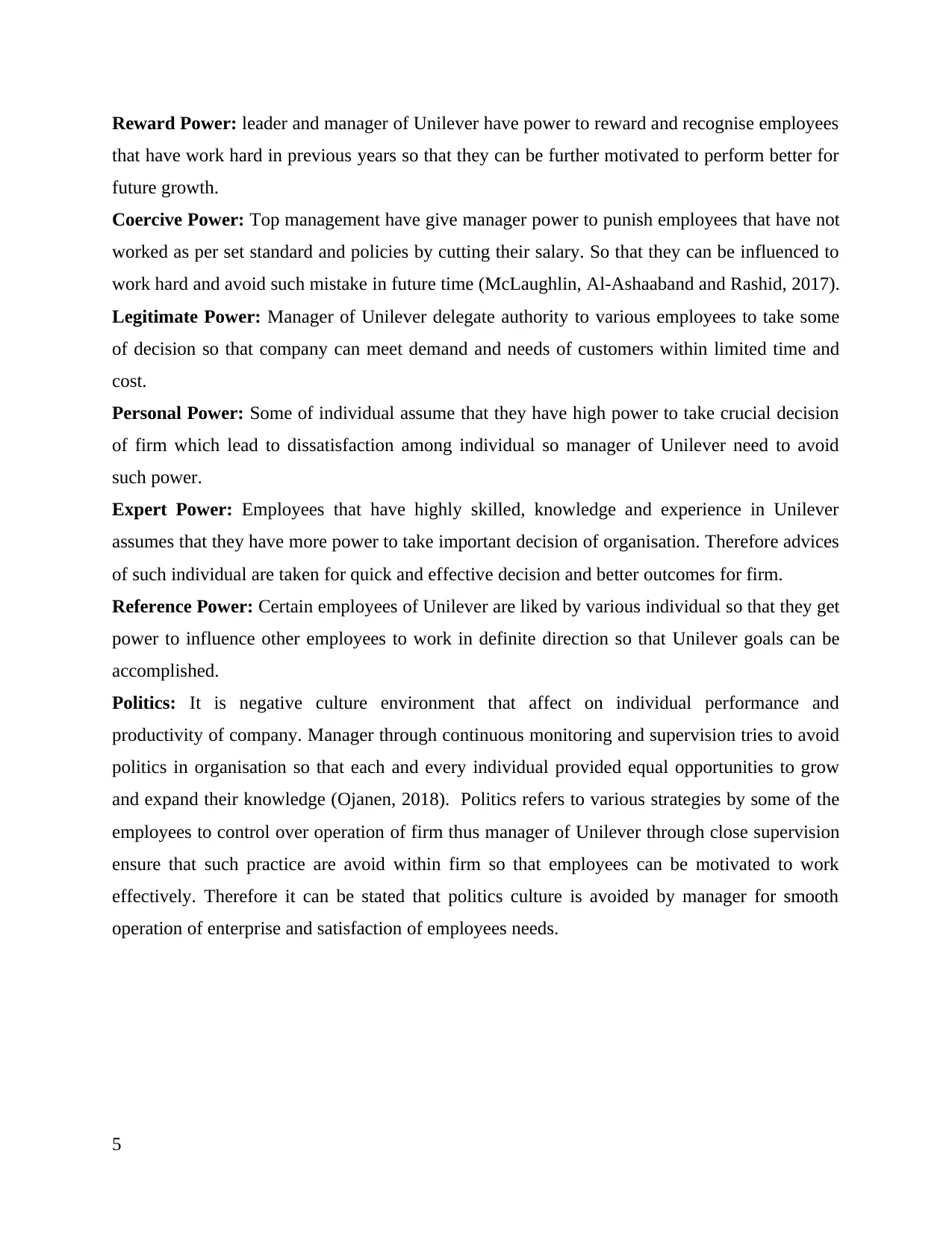
Reward Power: leader and manager of Unilever have power to reward and recognise employees
that have work hard in previous years so that they can be further motivated to perform better for
future growth.
Coercive Power: Top management have give manager power to punish employees that have not
worked as per set standard and policies by cutting their salary. So that they can be influenced to
work hard and avoid such mistake in future time (McLaughlin, Al-Ashaaband and Rashid, 2017).
Legitimate Power: Manager of Unilever delegate authority to various employees to take some
of decision so that company can meet demand and needs of customers within limited time and
cost.
Personal Power: Some of individual assume that they have high power to take crucial decision
of firm which lead to dissatisfaction among individual so manager of Unilever need to avoid
such power.
Expert Power: Employees that have highly skilled, knowledge and experience in Unilever
assumes that they have more power to take important decision of organisation. Therefore advices
of such individual are taken for quick and effective decision and better outcomes for firm.
Reference Power: Certain employees of Unilever are liked by various individual so that they get
power to influence other employees to work in definite direction so that Unilever goals can be
accomplished.
Politics: It is negative culture environment that affect on individual performance and
productivity of company. Manager through continuous monitoring and supervision tries to avoid
politics in organisation so that each and every individual provided equal opportunities to grow
and expand their knowledge (Ojanen, 2018). Politics refers to various strategies by some of the
employees to control over operation of firm thus manager of Unilever through close supervision
ensure that such practice are avoid within firm so that employees can be motivated to work
effectively. Therefore it can be stated that politics culture is avoided by manager for smooth
operation of enterprise and satisfaction of employees needs.
5
that have work hard in previous years so that they can be further motivated to perform better for
future growth.
Coercive Power: Top management have give manager power to punish employees that have not
worked as per set standard and policies by cutting their salary. So that they can be influenced to
work hard and avoid such mistake in future time (McLaughlin, Al-Ashaaband and Rashid, 2017).
Legitimate Power: Manager of Unilever delegate authority to various employees to take some
of decision so that company can meet demand and needs of customers within limited time and
cost.
Personal Power: Some of individual assume that they have high power to take crucial decision
of firm which lead to dissatisfaction among individual so manager of Unilever need to avoid
such power.
Expert Power: Employees that have highly skilled, knowledge and experience in Unilever
assumes that they have more power to take important decision of organisation. Therefore advices
of such individual are taken for quick and effective decision and better outcomes for firm.
Reference Power: Certain employees of Unilever are liked by various individual so that they get
power to influence other employees to work in definite direction so that Unilever goals can be
accomplished.
Politics: It is negative culture environment that affect on individual performance and
productivity of company. Manager through continuous monitoring and supervision tries to avoid
politics in organisation so that each and every individual provided equal opportunities to grow
and expand their knowledge (Ojanen, 2018). Politics refers to various strategies by some of the
employees to control over operation of firm thus manager of Unilever through close supervision
ensure that such practice are avoid within firm so that employees can be motivated to work
effectively. Therefore it can be stated that politics culture is avoided by manager for smooth
operation of enterprise and satisfaction of employees needs.
5
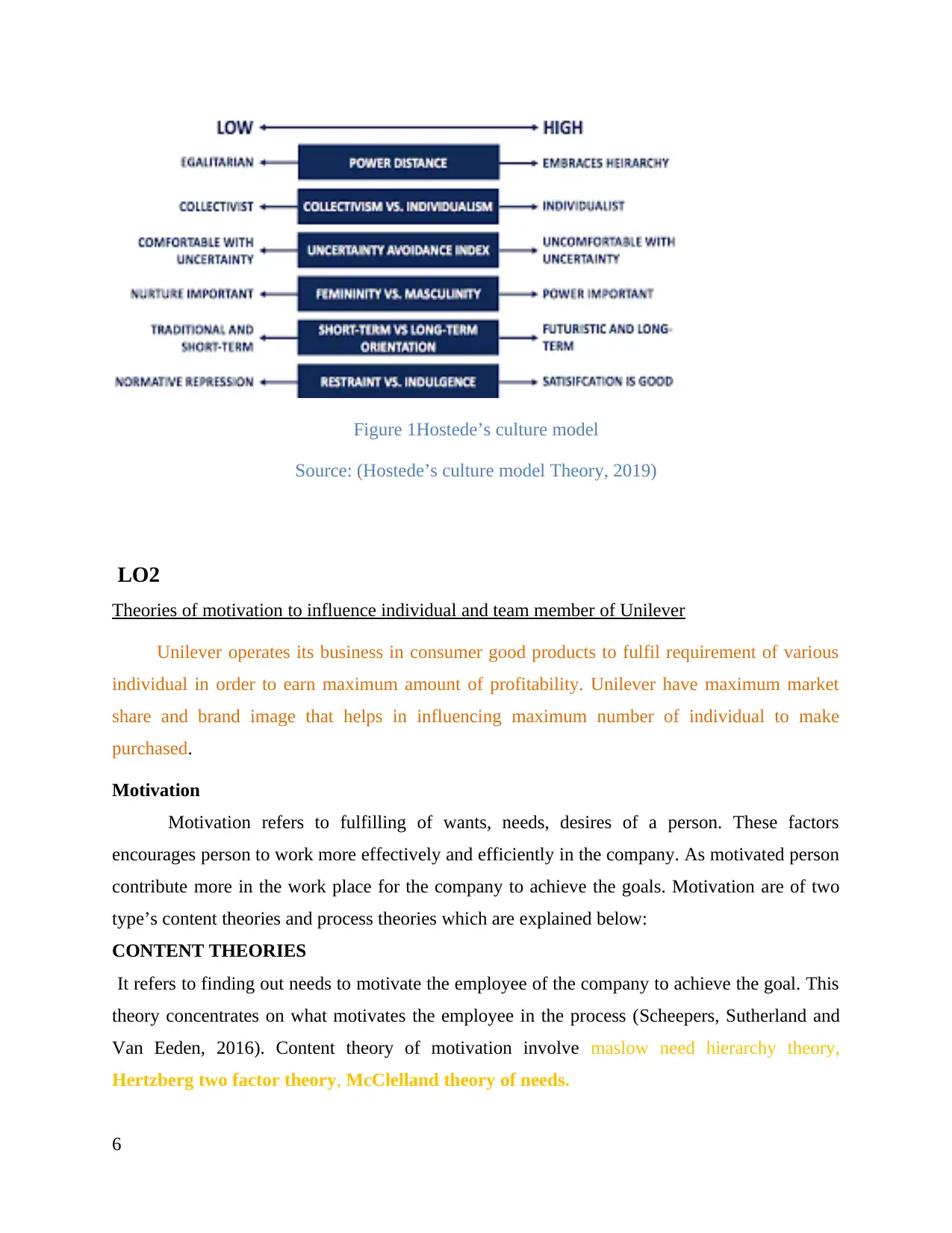
Figure 1Hostede’s culture model
Source: (Hostede’s culture model Theory, 2019)
LO2
Theories of motivation to influence individual and team member of Unilever
Unilever operates its business in consumer good products to fulfil requirement of various
individual in order to earn maximum amount of profitability. Unilever have maximum market
share and brand image that helps in influencing maximum number of individual to make
purchased.
Motivation
Motivation refers to fulfilling of wants, needs, desires of a person. These factors
encourages person to work more effectively and efficiently in the company. As motivated person
contribute more in the work place for the company to achieve the goals. Motivation are of two
type’s content theories and process theories which are explained below:
CONTENT THEORIES
It refers to finding out needs to motivate the employee of the company to achieve the goal. This
theory concentrates on what motivates the employee in the process (Scheepers, Sutherland and
Van Eeden, 2016). Content theory of motivation involve maslow need hierarchy theory,
Hertzberg two factor theory, McClelland theory of needs.
6
Source: (Hostede’s culture model Theory, 2019)
LO2
Theories of motivation to influence individual and team member of Unilever
Unilever operates its business in consumer good products to fulfil requirement of various
individual in order to earn maximum amount of profitability. Unilever have maximum market
share and brand image that helps in influencing maximum number of individual to make
purchased.
Motivation
Motivation refers to fulfilling of wants, needs, desires of a person. These factors
encourages person to work more effectively and efficiently in the company. As motivated person
contribute more in the work place for the company to achieve the goals. Motivation are of two
type’s content theories and process theories which are explained below:
CONTENT THEORIES
It refers to finding out needs to motivate the employee of the company to achieve the goal. This
theory concentrates on what motivates the employee in the process (Scheepers, Sutherland and
Van Eeden, 2016). Content theory of motivation involve maslow need hierarchy theory,
Hertzberg two factor theory, McClelland theory of needs.
6
⊘ This is a preview!⊘
Do you want full access?
Subscribe today to unlock all pages.

Trusted by 1+ million students worldwide
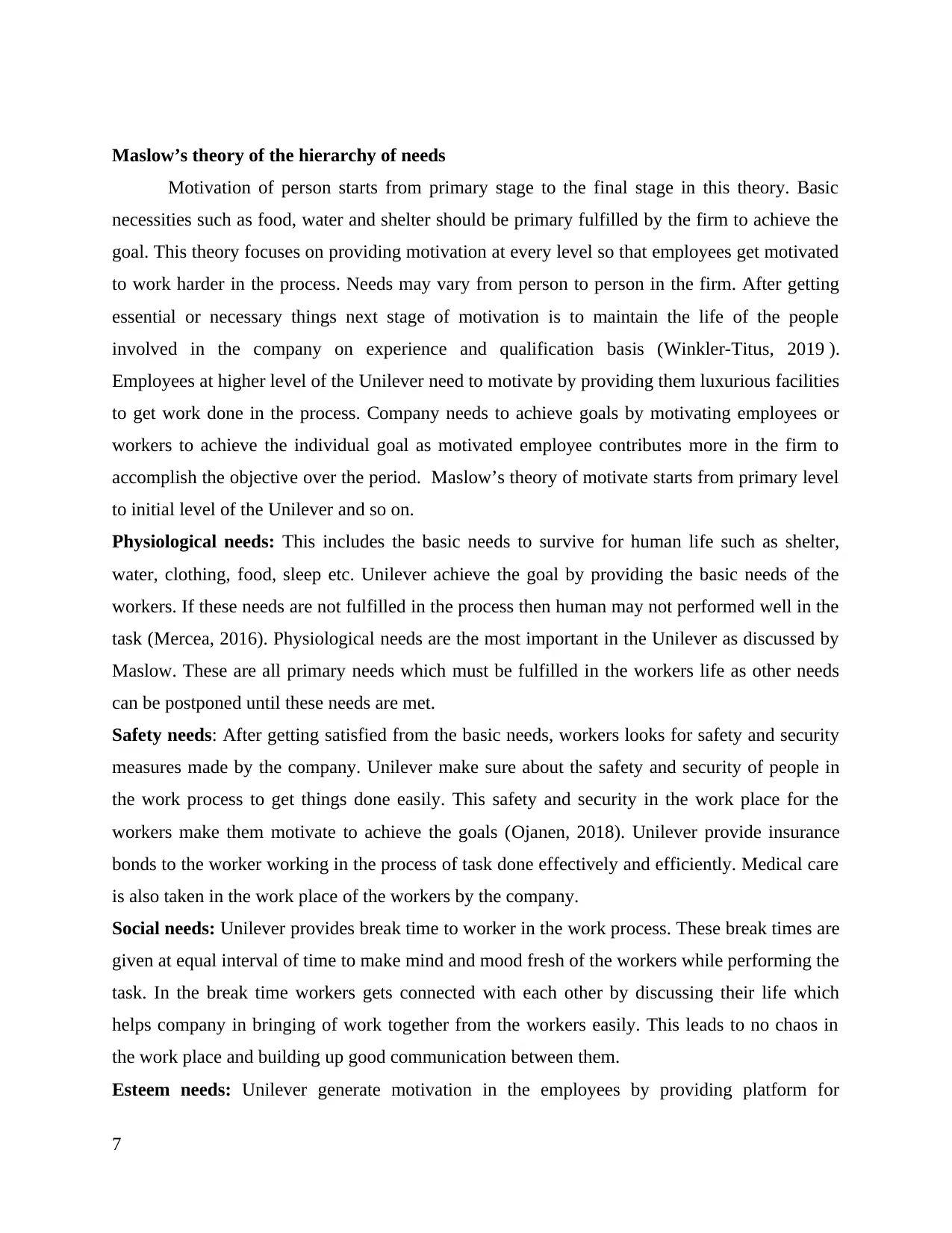
Maslow’s theory of the hierarchy of needs
Motivation of person starts from primary stage to the final stage in this theory. Basic
necessities such as food, water and shelter should be primary fulfilled by the firm to achieve the
goal. This theory focuses on providing motivation at every level so that employees get motivated
to work harder in the process. Needs may vary from person to person in the firm. After getting
essential or necessary things next stage of motivation is to maintain the life of the people
involved in the company on experience and qualification basis (Winkler-Titus, 2019 ).
Employees at higher level of the Unilever need to motivate by providing them luxurious facilities
to get work done in the process. Company needs to achieve goals by motivating employees or
workers to achieve the individual goal as motivated employee contributes more in the firm to
accomplish the objective over the period. Maslow’s theory of motivate starts from primary level
to initial level of the Unilever and so on.
Physiological needs: This includes the basic needs to survive for human life such as shelter,
water, clothing, food, sleep etc. Unilever achieve the goal by providing the basic needs of the
workers. If these needs are not fulfilled in the process then human may not performed well in the
task (Mercea, 2016). Physiological needs are the most important in the Unilever as discussed by
Maslow. These are all primary needs which must be fulfilled in the workers life as other needs
can be postponed until these needs are met.
Safety needs: After getting satisfied from the basic needs, workers looks for safety and security
measures made by the company. Unilever make sure about the safety and security of people in
the work process to get things done easily. This safety and security in the work place for the
workers make them motivate to achieve the goals (Ojanen, 2018). Unilever provide insurance
bonds to the worker working in the process of task done effectively and efficiently. Medical care
is also taken in the work place of the workers by the company.
Social needs: Unilever provides break time to worker in the work process. These break times are
given at equal interval of time to make mind and mood fresh of the workers while performing the
task. In the break time workers gets connected with each other by discussing their life which
helps company in bringing of work together from the workers easily. This leads to no chaos in
the work place and building up good communication between them.
Esteem needs: Unilever generate motivation in the employees by providing platform for
7
Motivation of person starts from primary stage to the final stage in this theory. Basic
necessities such as food, water and shelter should be primary fulfilled by the firm to achieve the
goal. This theory focuses on providing motivation at every level so that employees get motivated
to work harder in the process. Needs may vary from person to person in the firm. After getting
essential or necessary things next stage of motivation is to maintain the life of the people
involved in the company on experience and qualification basis (Winkler-Titus, 2019 ).
Employees at higher level of the Unilever need to motivate by providing them luxurious facilities
to get work done in the process. Company needs to achieve goals by motivating employees or
workers to achieve the individual goal as motivated employee contributes more in the firm to
accomplish the objective over the period. Maslow’s theory of motivate starts from primary level
to initial level of the Unilever and so on.
Physiological needs: This includes the basic needs to survive for human life such as shelter,
water, clothing, food, sleep etc. Unilever achieve the goal by providing the basic needs of the
workers. If these needs are not fulfilled in the process then human may not performed well in the
task (Mercea, 2016). Physiological needs are the most important in the Unilever as discussed by
Maslow. These are all primary needs which must be fulfilled in the workers life as other needs
can be postponed until these needs are met.
Safety needs: After getting satisfied from the basic needs, workers looks for safety and security
measures made by the company. Unilever make sure about the safety and security of people in
the work process to get things done easily. This safety and security in the work place for the
workers make them motivate to achieve the goals (Ojanen, 2018). Unilever provide insurance
bonds to the worker working in the process of task done effectively and efficiently. Medical care
is also taken in the work place of the workers by the company.
Social needs: Unilever provides break time to worker in the work process. These break times are
given at equal interval of time to make mind and mood fresh of the workers while performing the
task. In the break time workers gets connected with each other by discussing their life which
helps company in bringing of work together from the workers easily. This leads to no chaos in
the work place and building up good communication between them.
Esteem needs: Unilever generate motivation in the employees by providing platform for
7
Paraphrase This Document
Need a fresh take? Get an instant paraphrase of this document with our AI Paraphraser
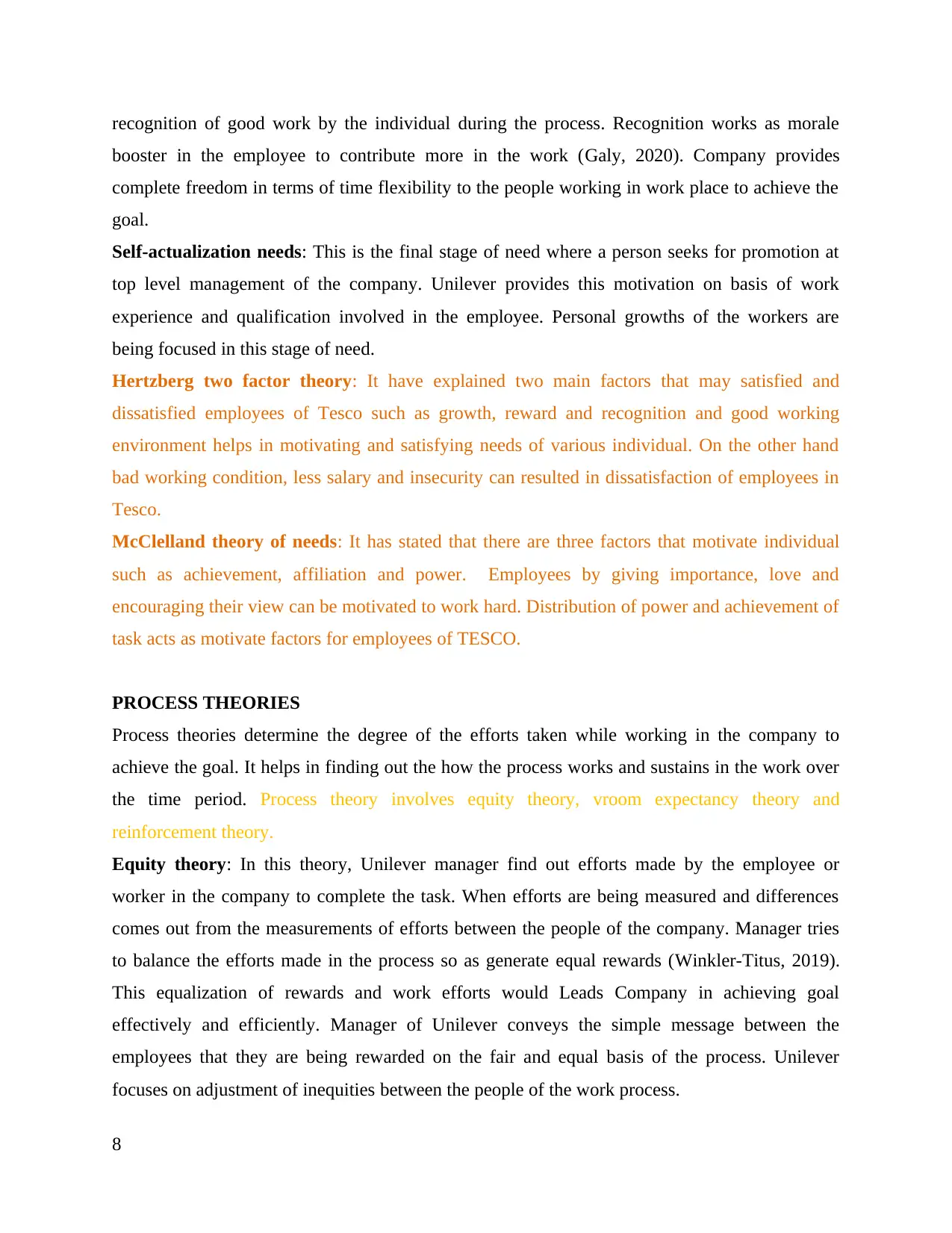
recognition of good work by the individual during the process. Recognition works as morale
booster in the employee to contribute more in the work (Galy, 2020). Company provides
complete freedom in terms of time flexibility to the people working in work place to achieve the
goal.
Self-actualization needs: This is the final stage of need where a person seeks for promotion at
top level management of the company. Unilever provides this motivation on basis of work
experience and qualification involved in the employee. Personal growths of the workers are
being focused in this stage of need.
Hertzberg two factor theory: It have explained two main factors that may satisfied and
dissatisfied employees of Tesco such as growth, reward and recognition and good working
environment helps in motivating and satisfying needs of various individual. On the other hand
bad working condition, less salary and insecurity can resulted in dissatisfaction of employees in
Tesco.
McClelland theory of needs: It has stated that there are three factors that motivate individual
such as achievement, affiliation and power. Employees by giving importance, love and
encouraging their view can be motivated to work hard. Distribution of power and achievement of
task acts as motivate factors for employees of TESCO.
PROCESS THEORIES
Process theories determine the degree of the efforts taken while working in the company to
achieve the goal. It helps in finding out the how the process works and sustains in the work over
the time period. Process theory involves equity theory, vroom expectancy theory and
reinforcement theory.
Equity theory: In this theory, Unilever manager find out efforts made by the employee or
worker in the company to complete the task. When efforts are being measured and differences
comes out from the measurements of efforts between the people of the company. Manager tries
to balance the efforts made in the process so as generate equal rewards (Winkler-Titus, 2019).
This equalization of rewards and work efforts would Leads Company in achieving goal
effectively and efficiently. Manager of Unilever conveys the simple message between the
employees that they are being rewarded on the fair and equal basis of the process. Unilever
focuses on adjustment of inequities between the people of the work process.
8
booster in the employee to contribute more in the work (Galy, 2020). Company provides
complete freedom in terms of time flexibility to the people working in work place to achieve the
goal.
Self-actualization needs: This is the final stage of need where a person seeks for promotion at
top level management of the company. Unilever provides this motivation on basis of work
experience and qualification involved in the employee. Personal growths of the workers are
being focused in this stage of need.
Hertzberg two factor theory: It have explained two main factors that may satisfied and
dissatisfied employees of Tesco such as growth, reward and recognition and good working
environment helps in motivating and satisfying needs of various individual. On the other hand
bad working condition, less salary and insecurity can resulted in dissatisfaction of employees in
Tesco.
McClelland theory of needs: It has stated that there are three factors that motivate individual
such as achievement, affiliation and power. Employees by giving importance, love and
encouraging their view can be motivated to work hard. Distribution of power and achievement of
task acts as motivate factors for employees of TESCO.
PROCESS THEORIES
Process theories determine the degree of the efforts taken while working in the company to
achieve the goal. It helps in finding out the how the process works and sustains in the work over
the time period. Process theory involves equity theory, vroom expectancy theory and
reinforcement theory.
Equity theory: In this theory, Unilever manager find out efforts made by the employee or
worker in the company to complete the task. When efforts are being measured and differences
comes out from the measurements of efforts between the people of the company. Manager tries
to balance the efforts made in the process so as generate equal rewards (Winkler-Titus, 2019).
This equalization of rewards and work efforts would Leads Company in achieving goal
effectively and efficiently. Manager of Unilever conveys the simple message between the
employees that they are being rewarded on the fair and equal basis of the process. Unilever
focuses on adjustment of inequities between the people of the work process.
8
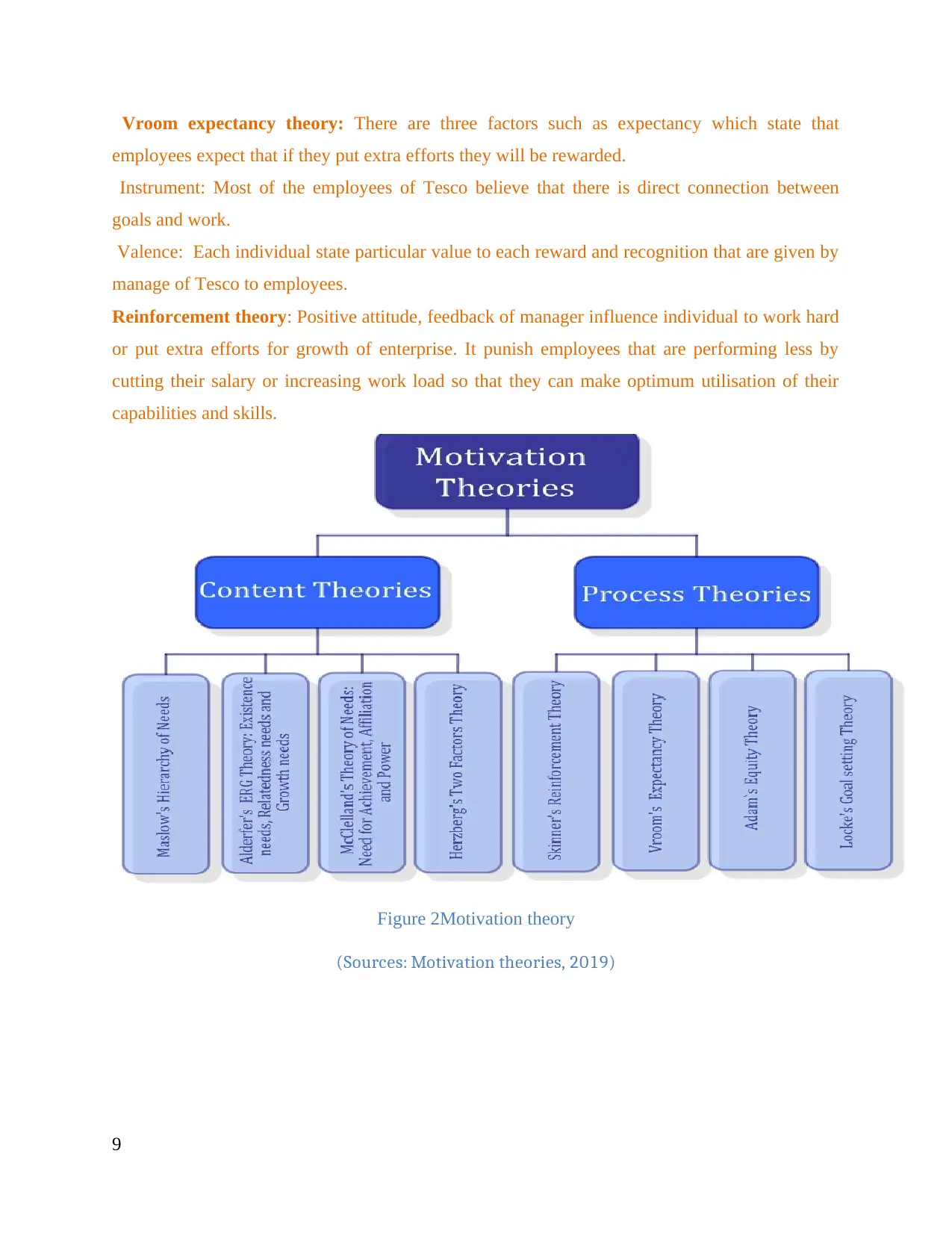
Vroom expectancy theory: There are three factors such as expectancy which state that
employees expect that if they put extra efforts they will be rewarded.
Instrument: Most of the employees of Tesco believe that there is direct connection between
goals and work.
Valence: Each individual state particular value to each reward and recognition that are given by
manage of Tesco to employees.
Reinforcement theory: Positive attitude, feedback of manager influence individual to work hard
or put extra efforts for growth of enterprise. It punish employees that are performing less by
cutting their salary or increasing work load so that they can make optimum utilisation of their
capabilities and skills.
Figure 2Motivation theory
(Sources: Motivation theories, 2019)
9
employees expect that if they put extra efforts they will be rewarded.
Instrument: Most of the employees of Tesco believe that there is direct connection between
goals and work.
Valence: Each individual state particular value to each reward and recognition that are given by
manage of Tesco to employees.
Reinforcement theory: Positive attitude, feedback of manager influence individual to work hard
or put extra efforts for growth of enterprise. It punish employees that are performing less by
cutting their salary or increasing work load so that they can make optimum utilisation of their
capabilities and skills.
Figure 2Motivation theory
(Sources: Motivation theories, 2019)
9
⊘ This is a preview!⊘
Do you want full access?
Subscribe today to unlock all pages.

Trusted by 1+ million students worldwide
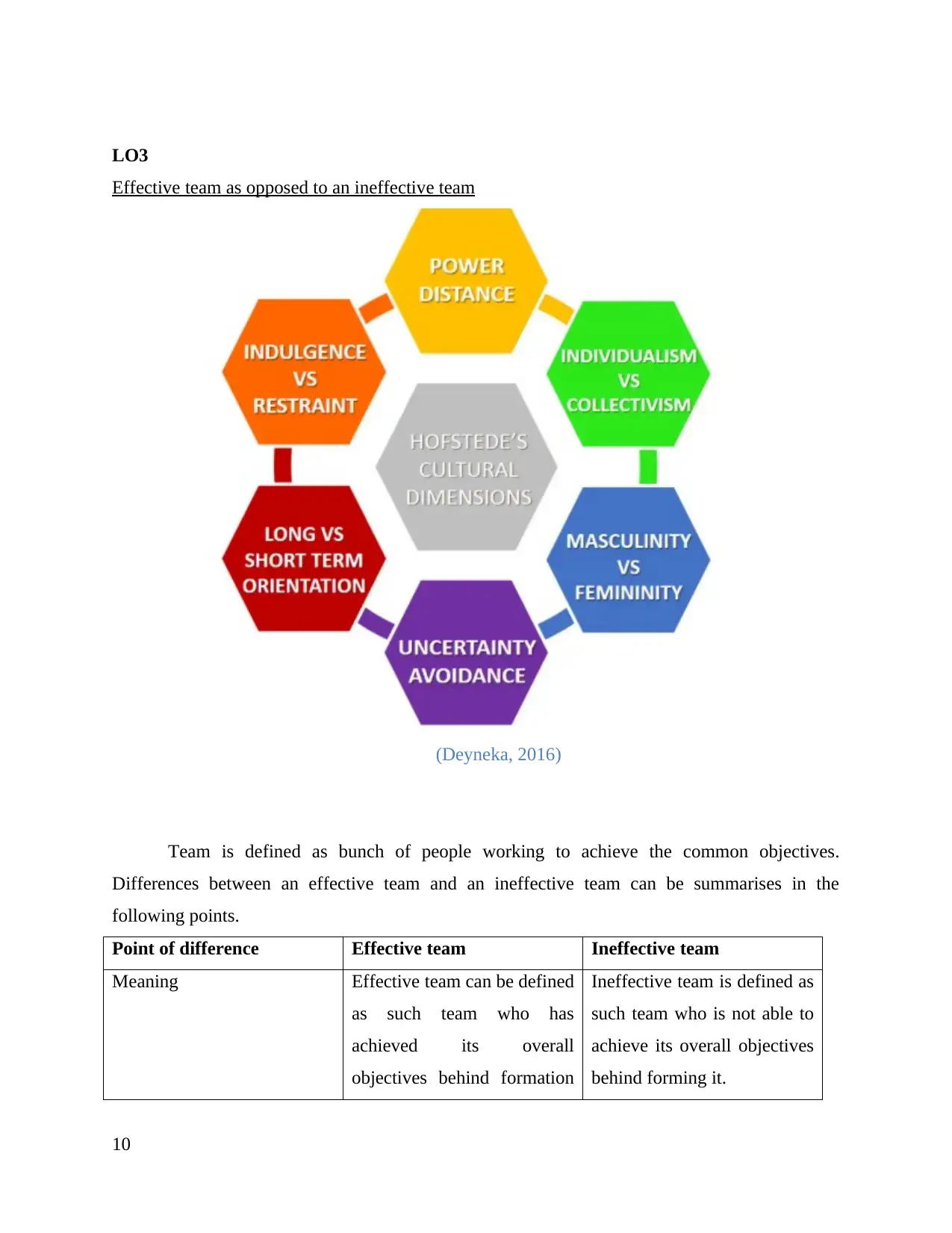
LO3
Effective team as opposed to an ineffective team
(Deyneka, 2016)
Team is defined as bunch of people working to achieve the common objectives.
Differences between an effective team and an ineffective team can be summarises in the
following points.
Point of difference Effective team Ineffective team
Meaning Effective team can be defined
as such team who has
achieved its overall
objectives behind formation
Ineffective team is defined as
such team who is not able to
achieve its overall objectives
behind forming it.
10
Effective team as opposed to an ineffective team
(Deyneka, 2016)
Team is defined as bunch of people working to achieve the common objectives.
Differences between an effective team and an ineffective team can be summarises in the
following points.
Point of difference Effective team Ineffective team
Meaning Effective team can be defined
as such team who has
achieved its overall
objectives behind formation
Ineffective team is defined as
such team who is not able to
achieve its overall objectives
behind forming it.
10
Paraphrase This Document
Need a fresh take? Get an instant paraphrase of this document with our AI Paraphraser
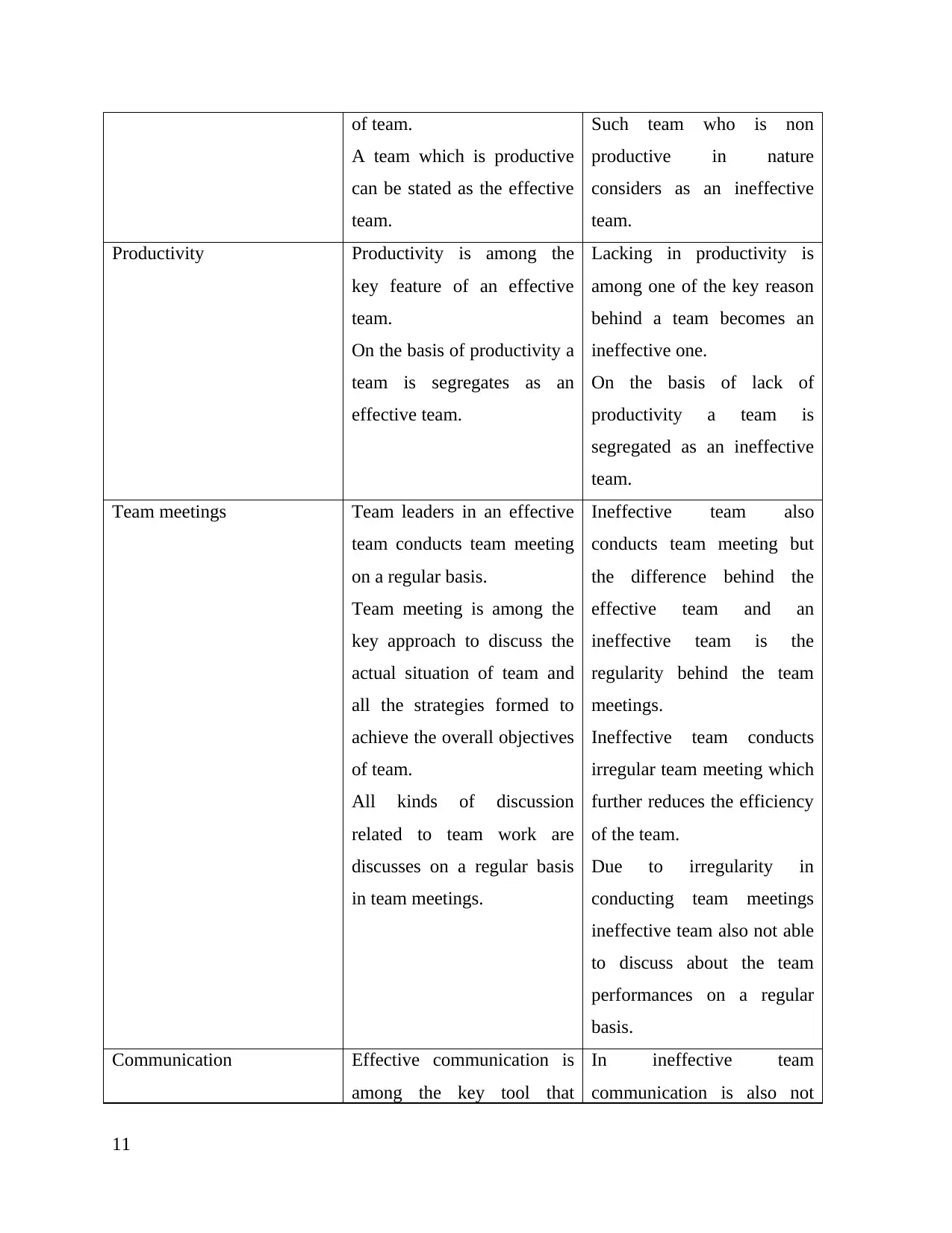
of team.
A team which is productive
can be stated as the effective
team.
Such team who is non
productive in nature
considers as an ineffective
team.
Productivity Productivity is among the
key feature of an effective
team.
On the basis of productivity a
team is segregates as an
effective team.
Lacking in productivity is
among one of the key reason
behind a team becomes an
ineffective one.
On the basis of lack of
productivity a team is
segregated as an ineffective
team.
Team meetings Team leaders in an effective
team conducts team meeting
on a regular basis.
Team meeting is among the
key approach to discuss the
actual situation of team and
all the strategies formed to
achieve the overall objectives
of team.
All kinds of discussion
related to team work are
discusses on a regular basis
in team meetings.
Ineffective team also
conducts team meeting but
the difference behind the
effective team and an
ineffective team is the
regularity behind the team
meetings.
Ineffective team conducts
irregular team meeting which
further reduces the efficiency
of the team.
Due to irregularity in
conducting team meetings
ineffective team also not able
to discuss about the team
performances on a regular
basis.
Communication Effective communication is
among the key tool that
In ineffective team
communication is also not
11
A team which is productive
can be stated as the effective
team.
Such team who is non
productive in nature
considers as an ineffective
team.
Productivity Productivity is among the
key feature of an effective
team.
On the basis of productivity a
team is segregates as an
effective team.
Lacking in productivity is
among one of the key reason
behind a team becomes an
ineffective one.
On the basis of lack of
productivity a team is
segregated as an ineffective
team.
Team meetings Team leaders in an effective
team conducts team meeting
on a regular basis.
Team meeting is among the
key approach to discuss the
actual situation of team and
all the strategies formed to
achieve the overall objectives
of team.
All kinds of discussion
related to team work are
discusses on a regular basis
in team meetings.
Ineffective team also
conducts team meeting but
the difference behind the
effective team and an
ineffective team is the
regularity behind the team
meetings.
Ineffective team conducts
irregular team meeting which
further reduces the efficiency
of the team.
Due to irregularity in
conducting team meetings
ineffective team also not able
to discuss about the team
performances on a regular
basis.
Communication Effective communication is
among the key tool that
In ineffective team
communication is also not
11
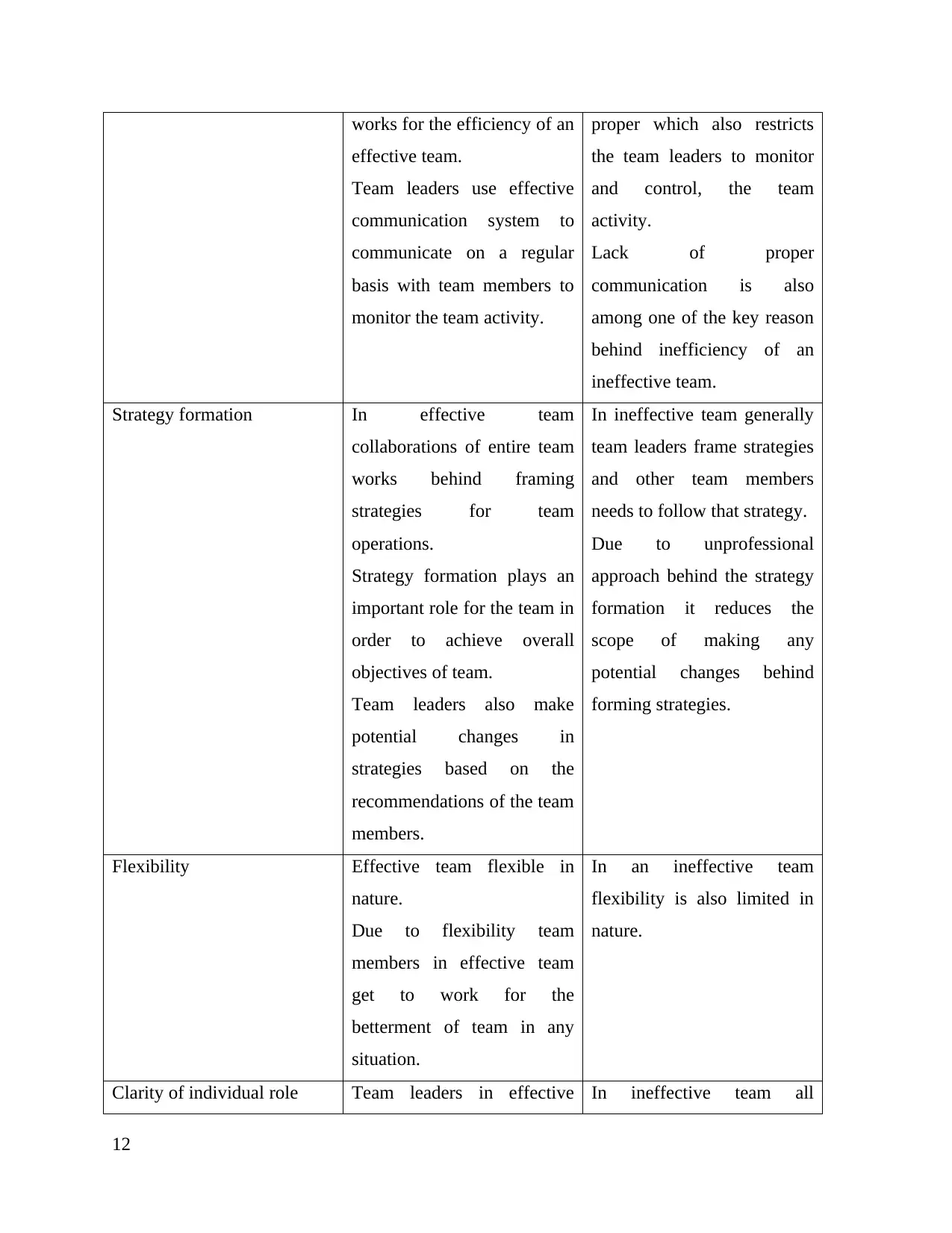
works for the efficiency of an
effective team.
Team leaders use effective
communication system to
communicate on a regular
basis with team members to
monitor the team activity.
proper which also restricts
the team leaders to monitor
and control, the team
activity.
Lack of proper
communication is also
among one of the key reason
behind inefficiency of an
ineffective team.
Strategy formation In effective team
collaborations of entire team
works behind framing
strategies for team
operations.
Strategy formation plays an
important role for the team in
order to achieve overall
objectives of team.
Team leaders also make
potential changes in
strategies based on the
recommendations of the team
members.
In ineffective team generally
team leaders frame strategies
and other team members
needs to follow that strategy.
Due to unprofessional
approach behind the strategy
formation it reduces the
scope of making any
potential changes behind
forming strategies.
Flexibility Effective team flexible in
nature.
Due to flexibility team
members in effective team
get to work for the
betterment of team in any
situation.
In an ineffective team
flexibility is also limited in
nature.
Clarity of individual role Team leaders in effective In ineffective team all
12
effective team.
Team leaders use effective
communication system to
communicate on a regular
basis with team members to
monitor the team activity.
proper which also restricts
the team leaders to monitor
and control, the team
activity.
Lack of proper
communication is also
among one of the key reason
behind inefficiency of an
ineffective team.
Strategy formation In effective team
collaborations of entire team
works behind framing
strategies for team
operations.
Strategy formation plays an
important role for the team in
order to achieve overall
objectives of team.
Team leaders also make
potential changes in
strategies based on the
recommendations of the team
members.
In ineffective team generally
team leaders frame strategies
and other team members
needs to follow that strategy.
Due to unprofessional
approach behind the strategy
formation it reduces the
scope of making any
potential changes behind
forming strategies.
Flexibility Effective team flexible in
nature.
Due to flexibility team
members in effective team
get to work for the
betterment of team in any
situation.
In an ineffective team
flexibility is also limited in
nature.
Clarity of individual role Team leaders in effective In ineffective team all
12
⊘ This is a preview!⊘
Do you want full access?
Subscribe today to unlock all pages.

Trusted by 1+ million students worldwide
1 out of 20
Related Documents
Your All-in-One AI-Powered Toolkit for Academic Success.
+13062052269
info@desklib.com
Available 24*7 on WhatsApp / Email
![[object Object]](/_next/static/media/star-bottom.7253800d.svg)
Unlock your academic potential
Copyright © 2020–2026 A2Z Services. All Rights Reserved. Developed and managed by ZUCOL.





